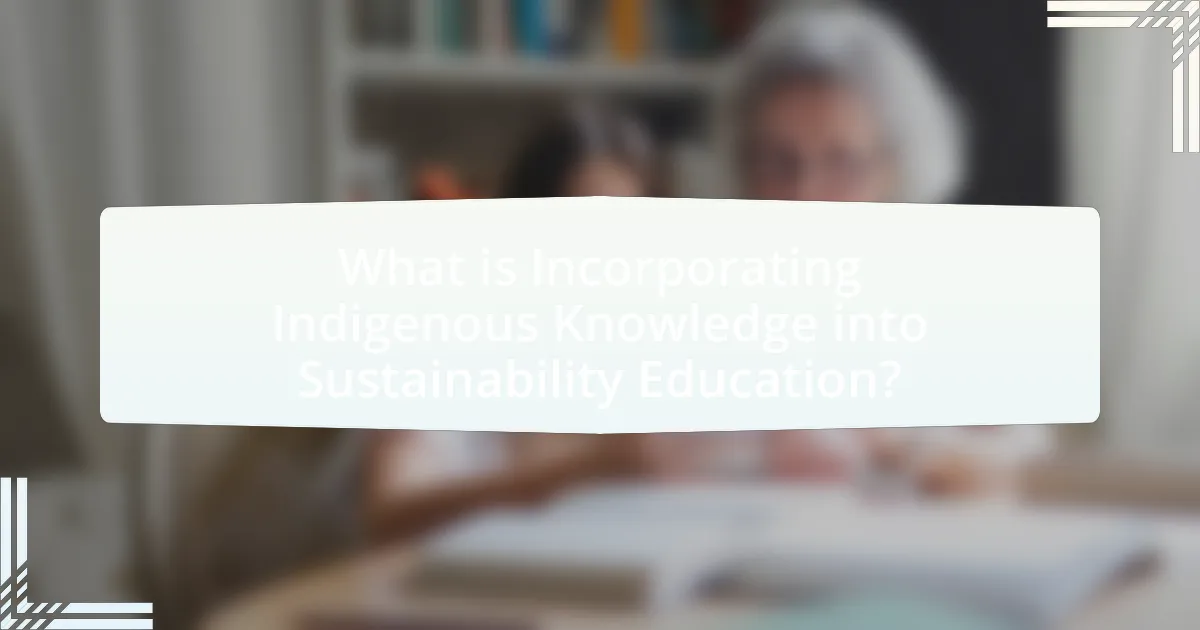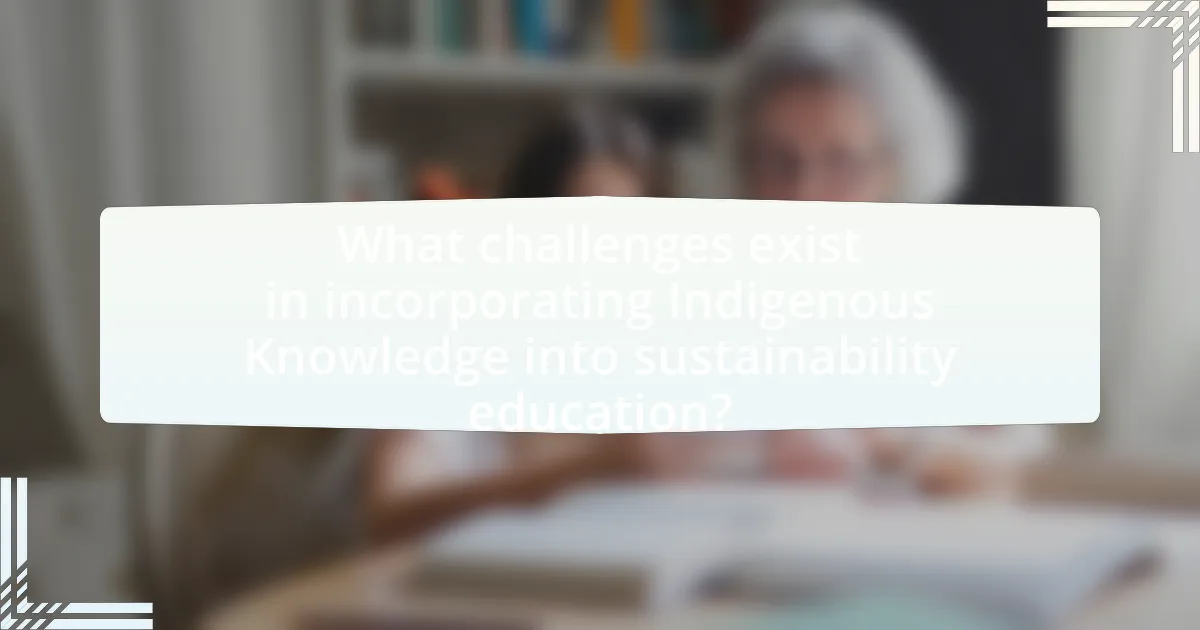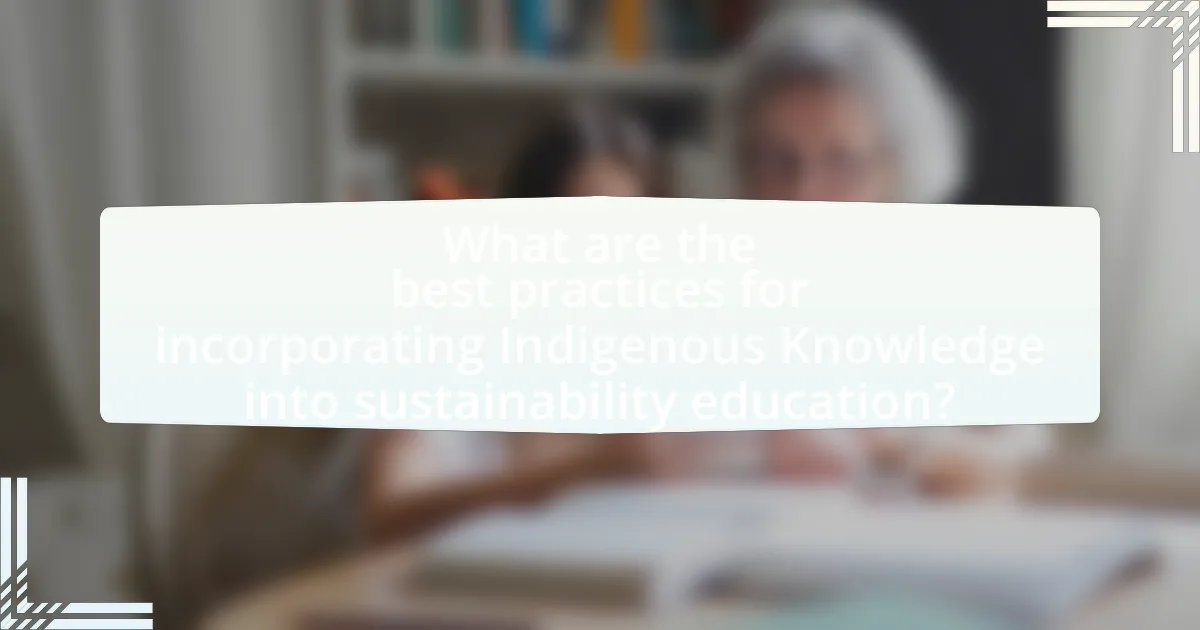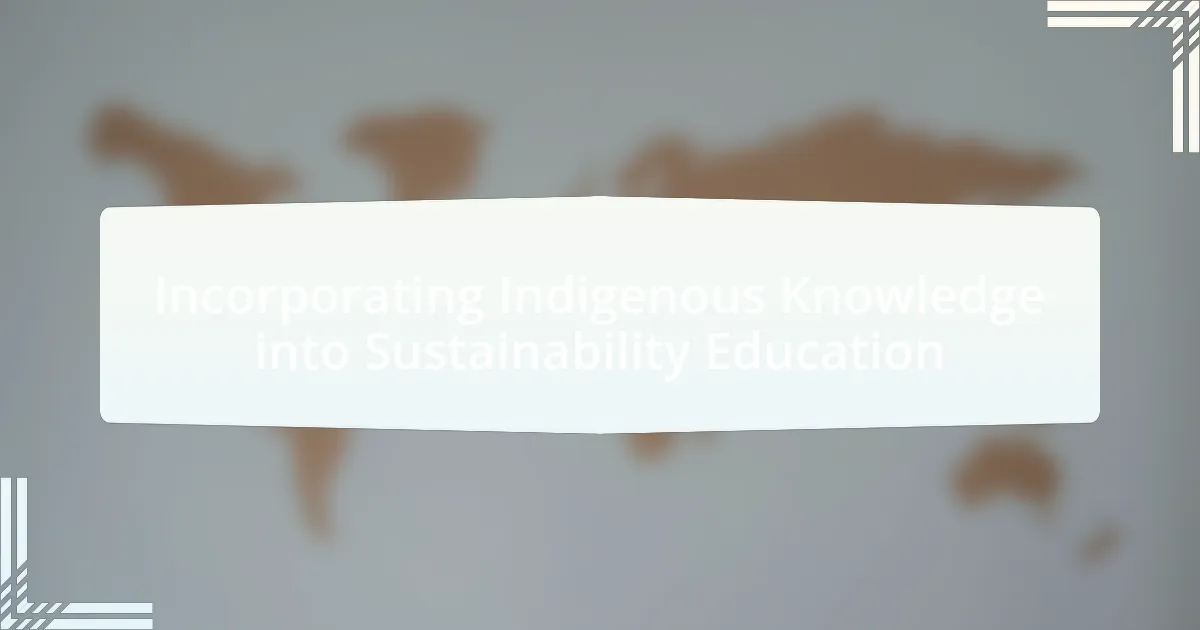Incorporating Indigenous Knowledge into Sustainability Education focuses on integrating traditional ecological knowledge and cultural practices of Indigenous peoples into educational frameworks aimed at promoting sustainability. This approach highlights the significance of Indigenous perspectives in environmental stewardship, biodiversity, and resource management, demonstrating how these age-old practices can enhance modern sustainability efforts. The article discusses the importance of Indigenous Knowledge, its key principles, and how it differs from Western scientific approaches, while also addressing the challenges educators face in integrating this knowledge into curricula. Furthermore, it outlines effective strategies for collaboration with Indigenous communities, the role of policy in supporting these initiatives, and practical steps educators can take to enrich their teaching with Indigenous perspectives.

What is Incorporating Indigenous Knowledge into Sustainability Education?
Incorporating Indigenous Knowledge into Sustainability Education involves integrating traditional ecological knowledge and cultural practices of Indigenous peoples into educational frameworks focused on sustainability. This approach recognizes the value of Indigenous perspectives in understanding environmental stewardship, biodiversity, and sustainable resource management. Research indicates that Indigenous knowledge systems, which have been developed over thousands of years, offer insights into sustainable practices that can enhance contemporary environmental education. For example, studies show that Indigenous land management techniques, such as controlled burns, can improve ecosystem health and resilience. By including these perspectives, sustainability education becomes more holistic and culturally relevant, fostering a deeper connection between students and the environment.
Why is Indigenous Knowledge important in sustainability education?
Indigenous Knowledge is important in sustainability education because it offers unique insights into ecological stewardship and sustainable practices developed over thousands of years. This knowledge encompasses a deep understanding of local ecosystems, biodiversity, and the interconnections between humans and nature, which can enhance contemporary sustainability efforts. For instance, Indigenous practices such as controlled burns for land management have been shown to reduce wildfire risks and promote biodiversity, as evidenced by studies highlighting the effectiveness of traditional ecological knowledge in managing landscapes sustainably. By integrating Indigenous Knowledge into sustainability education, learners can gain a holistic perspective that fosters respect for cultural diversity and promotes effective environmental stewardship.
What are the key principles of Indigenous Knowledge?
The key principles of Indigenous Knowledge include a deep connection to the land, holistic understanding, community involvement, and the integration of traditional practices with contemporary knowledge. Indigenous Knowledge emphasizes the relationship between people and their environment, recognizing that cultural practices and ecological systems are interdependent. This knowledge is often passed down through generations, fostering a sense of identity and belonging within communities. Furthermore, it encourages collaborative approaches to problem-solving, valuing the input of all community members, and integrating traditional ecological knowledge with modern scientific methods to promote sustainability.
How does Indigenous Knowledge differ from Western scientific approaches?
Indigenous Knowledge differs from Western scientific approaches primarily in its holistic and relational understanding of the environment. While Western science often emphasizes empirical data, experimentation, and objective analysis, Indigenous Knowledge integrates spiritual, cultural, and historical contexts, viewing humans as interconnected with nature. For example, Indigenous practices often involve traditional ecological knowledge that has been passed down through generations, emphasizing sustainability and stewardship, as seen in practices like controlled burning in Australian Aboriginal cultures to manage land and promote biodiversity. This contrast highlights the importance of context and community in Indigenous Knowledge, which is often overlooked in Western scientific methodologies.
How can Indigenous Knowledge enhance sustainability practices?
Indigenous Knowledge can enhance sustainability practices by providing holistic approaches to resource management that prioritize ecological balance and community well-being. This knowledge, developed over generations, emphasizes the interconnectedness of humans and nature, leading to sustainable practices such as rotational farming, traditional ecological knowledge, and biodiversity conservation. For instance, Indigenous land management techniques, like controlled burns used by Australian Aboriginal peoples, have been shown to reduce wildfire risks and promote biodiversity, as documented in studies by the Australian government. These practices not only preserve ecosystems but also foster resilience against climate change, demonstrating the practical benefits of integrating Indigenous Knowledge into contemporary sustainability efforts.
What examples exist of successful integration of Indigenous Knowledge in sustainability?
Successful integration of Indigenous Knowledge in sustainability is exemplified by the use of traditional ecological knowledge (TEK) in land management practices. For instance, the collaboration between Indigenous communities and government agencies in the United States has led to the restoration of ecosystems through controlled burns, a practice rooted in Indigenous fire management techniques. Research conducted by the U.S. Forest Service highlights that these practices not only reduce wildfire risks but also enhance biodiversity and ecosystem resilience. Additionally, the incorporation of Indigenous agricultural practices, such as the Three Sisters planting method (corn, beans, and squash), has been shown to improve soil health and crop yields, as documented in studies by the University of Vermont. These examples demonstrate the effectiveness of integrating Indigenous Knowledge into contemporary sustainability efforts.
How does Indigenous Knowledge contribute to biodiversity conservation?
Indigenous Knowledge contributes to biodiversity conservation by providing a deep understanding of local ecosystems and sustainable practices developed over generations. This knowledge includes traditional ecological practices, such as rotational farming and controlled burns, which enhance habitat diversity and promote species resilience. For instance, Indigenous fire management techniques have been shown to reduce the risk of catastrophic wildfires while maintaining biodiversity in ecosystems like the Australian bush. Furthermore, Indigenous communities often possess detailed knowledge of native species and their interrelationships, which can inform conservation strategies and policy-making. This integration of Indigenous Knowledge into modern conservation efforts has been recognized by organizations such as the United Nations, which emphasizes the importance of Indigenous perspectives in achieving global biodiversity targets.

What challenges exist in incorporating Indigenous Knowledge into sustainability education?
Incorporating Indigenous Knowledge into sustainability education faces several challenges, primarily including cultural misunderstandings, lack of representation, and institutional barriers. Cultural misunderstandings arise when educators misinterpret Indigenous perspectives or fail to recognize their validity, leading to a superficial integration of knowledge. Lack of representation is evident in educational materials and curricula that often overlook Indigenous voices, which diminishes the authenticity of the knowledge shared. Institutional barriers, such as rigid educational frameworks and policies that do not accommodate Indigenous methodologies, further complicate the incorporation process. These challenges hinder the effective blending of Indigenous Knowledge with sustainability education, limiting its potential impact on fostering holistic environmental stewardship.
What barriers do educators face when integrating Indigenous Knowledge?
Educators face several barriers when integrating Indigenous Knowledge, including a lack of resources, insufficient training, and systemic biases within educational frameworks. The absence of culturally relevant materials limits educators’ ability to effectively teach Indigenous perspectives. Additionally, many educators have not received adequate training on Indigenous issues, which can lead to misunderstandings or misrepresentations of Indigenous Knowledge. Systemic biases in curricula often prioritize Western knowledge systems, marginalizing Indigenous perspectives and making it challenging for educators to incorporate these teachings meaningfully. These barriers hinder the effective integration of Indigenous Knowledge into sustainability education, which is essential for fostering a more inclusive and holistic understanding of environmental issues.
How can cultural misunderstandings hinder the incorporation process?
Cultural misunderstandings can significantly hinder the incorporation process of Indigenous knowledge into sustainability education by creating barriers to effective communication and collaboration. When educators and Indigenous communities fail to understand each other’s cultural contexts, values, and practices, it can lead to misinterpretations of knowledge and intentions. For instance, a study by the National Congress of American Indians highlights that differing worldviews regarding land stewardship can result in conflicts over educational content and methods, ultimately impeding the integration of Indigenous perspectives into curricula. This lack of mutual understanding can also foster mistrust, making it difficult for educators to engage meaningfully with Indigenous knowledge holders, thereby limiting the potential for a holistic and inclusive approach to sustainability education.
What role does institutional support play in overcoming these barriers?
Institutional support plays a crucial role in overcoming barriers to incorporating Indigenous knowledge into sustainability education by providing necessary resources, frameworks, and legitimacy. This support can manifest through funding for programs that integrate Indigenous perspectives, training for educators on culturally relevant pedagogy, and the establishment of partnerships with Indigenous communities. For instance, research by the University of Alberta highlights that institutions that actively engage with Indigenous knowledge systems can enhance educational outcomes and foster mutual respect, thereby breaking down historical barriers. Such institutional backing not only facilitates curriculum development but also promotes an inclusive environment that values diverse knowledge systems, ultimately leading to more effective sustainability education.
How can collaboration with Indigenous communities improve sustainability education?
Collaboration with Indigenous communities can significantly enhance sustainability education by integrating traditional ecological knowledge and practices that have been developed over centuries. Indigenous communities possess a deep understanding of local ecosystems, biodiversity, and sustainable resource management, which can inform and enrich educational curricula. For instance, research conducted by the United Nations Educational, Scientific and Cultural Organization (UNESCO) highlights that Indigenous knowledge systems contribute to biodiversity conservation and climate change adaptation, demonstrating their relevance in contemporary sustainability education. By incorporating these perspectives, educational programs can foster a more holistic understanding of sustainability that respects cultural diversity and promotes environmental stewardship.
What are effective strategies for building partnerships with Indigenous communities?
Effective strategies for building partnerships with Indigenous communities include establishing trust through consistent engagement and respecting cultural protocols. Building trust requires ongoing communication and demonstrating a genuine commitment to understanding Indigenous perspectives and values. For instance, organizations that have successfully partnered with Indigenous communities often prioritize listening sessions to gather input and feedback, ensuring that community voices are heard and valued. Additionally, respecting cultural protocols involves recognizing and adhering to the traditions and governance structures of Indigenous groups, which fosters mutual respect and collaboration. Research indicates that partnerships grounded in these principles lead to more effective and sustainable outcomes in projects that incorporate Indigenous knowledge into sustainability education.
How can mutual respect and understanding be fostered in these collaborations?
Mutual respect and understanding in collaborations that incorporate Indigenous knowledge into sustainability education can be fostered through active listening and inclusive dialogue. Engaging all stakeholders, including Indigenous communities, in open discussions allows for the sharing of perspectives and experiences, which builds trust. Research indicates that when Indigenous voices are prioritized in educational settings, such as the study by Cajete (1994) in “Look to the Mountain,” it enhances cultural relevance and promotes a deeper understanding of sustainability principles. Additionally, establishing shared goals and recognizing the value of Indigenous knowledge systems alongside scientific approaches further cultivates respect and understanding among collaborators.

What are the best practices for incorporating Indigenous Knowledge into sustainability education?
The best practices for incorporating Indigenous Knowledge into sustainability education include engaging Indigenous communities in curriculum development, integrating traditional ecological knowledge with scientific principles, and fostering respectful partnerships. Engaging Indigenous communities ensures that the knowledge shared is authentic and relevant, as seen in programs like the Indigenous Knowledge and Education Project, which emphasizes collaboration with local tribes. Integrating traditional ecological knowledge, such as land stewardship practices, alongside scientific methods enhances students’ understanding of sustainable practices, as demonstrated by the work of the University of British Columbia’s Indigenous Studies program. Fostering respectful partnerships promotes mutual learning and respect, which is essential for effective education, as highlighted by the National Congress of American Indians’ guidelines on educational practices.
How can educators effectively teach Indigenous perspectives on sustainability?
Educators can effectively teach Indigenous perspectives on sustainability by integrating Indigenous knowledge systems into the curriculum and fostering collaborative learning environments. This approach involves recognizing the value of traditional ecological knowledge, which emphasizes the interconnectedness of all living things and the importance of stewardship. Research indicates that Indigenous communities have practiced sustainable resource management for thousands of years, demonstrating successful methods that can inform contemporary sustainability practices. For instance, the use of controlled burns by Indigenous peoples in North America has been shown to enhance biodiversity and reduce wildfire risks. By incorporating these practices and perspectives into educational settings, educators can provide students with a holistic understanding of sustainability that respects and honors Indigenous wisdom.
What resources are available for educators to learn about Indigenous Knowledge?
Educators can access various resources to learn about Indigenous Knowledge, including online courses, academic journals, and community workshops. For instance, the University of Alberta offers a course titled “Indigenous Canada,” which provides insights into Indigenous histories and contemporary issues. Additionally, the journal “Indigenous Knowledge: Issues and Perspectives” publishes research articles that explore Indigenous Knowledge systems. Community organizations, such as the First Nations Education Steering Committee, also provide workshops and resources tailored for educators to integrate Indigenous perspectives into their teaching. These resources are essential for fostering a deeper understanding of Indigenous Knowledge in the context of sustainability education.
How can experiential learning be utilized in this context?
Experiential learning can be utilized in the context of incorporating Indigenous knowledge into sustainability education by engaging learners in hands-on activities that reflect Indigenous practices and perspectives. This approach allows students to directly experience and understand the relationship between Indigenous communities and their environments, fostering a deeper appreciation for sustainable practices rooted in traditional knowledge. For instance, programs that involve community-based projects, such as restoring local ecosystems or participating in traditional land management practices, provide practical applications of Indigenous wisdom. Research indicates that experiential learning enhances retention and understanding, as evidenced by studies showing that students who engage in active, experiential learning demonstrate improved critical thinking and problem-solving skills related to environmental issues.
What role does policy play in supporting Indigenous Knowledge in education?
Policy plays a crucial role in supporting Indigenous Knowledge in education by establishing frameworks that promote the integration of Indigenous perspectives and practices into curricula. These policies can mandate the inclusion of Indigenous Knowledge, ensuring that educational institutions recognize and respect the cultural heritage and contributions of Indigenous communities. For instance, the Truth and Reconciliation Commission of Canada’s Calls to Action emphasize the need for educational reform that includes Indigenous Knowledge, which has led to various provincial and territorial policies aimed at curriculum development that reflects Indigenous histories and worldviews. Such policies not only validate Indigenous Knowledge but also foster a more inclusive and equitable educational environment, ultimately enhancing the learning experience for all students.
How can educational policies be shaped to include Indigenous perspectives?
Educational policies can be shaped to include Indigenous perspectives by integrating Indigenous knowledge systems into curricula and decision-making processes. This can be achieved through collaboration with Indigenous communities to co-develop educational content that reflects their histories, cultures, and worldviews. For instance, the incorporation of place-based learning, which emphasizes local Indigenous practices and ecological knowledge, has been shown to enhance students’ understanding of sustainability. Research indicates that when educational institutions actively engage with Indigenous leaders and educators, such as through the development of culturally relevant teaching materials, the educational outcomes for both Indigenous and non-Indigenous students improve, fostering mutual respect and understanding.
What examples of successful policy initiatives exist in this area?
Successful policy initiatives that incorporate Indigenous knowledge into sustainability education include the “First Nations Education Steering Committee” in British Columbia, which promotes curriculum development that integrates Indigenous perspectives and traditional ecological knowledge. This initiative has led to improved educational outcomes and cultural relevance in schools. Another example is the “Indigenous Knowledge and Climate Change” initiative by the United Nations, which emphasizes the importance of Indigenous practices in climate resilience strategies. This initiative has been recognized for its role in fostering collaboration between Indigenous communities and policymakers, enhancing the effectiveness of sustainability efforts.
What practical steps can educators take to incorporate Indigenous Knowledge into their curriculum?
Educators can incorporate Indigenous Knowledge into their curriculum by collaborating with Indigenous communities to develop culturally relevant content. This collaboration ensures that the curriculum reflects authentic Indigenous perspectives and practices, which are essential for understanding sustainability from a holistic viewpoint. For instance, educators can invite Indigenous elders to share traditional ecological knowledge, which emphasizes the interconnectedness of all living things and sustainable resource management. Research shows that integrating Indigenous Knowledge not only enriches the learning experience but also fosters respect for diverse worldviews, as highlighted in the study “Indigenous Knowledge in Education: A Review of the Literature” by K. A. McKinley and R. M. McKinley, published in the Journal of American Indian Education.

Leave a Reply